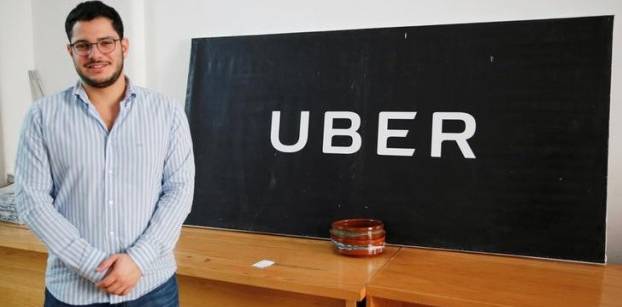Congested Cairo to become regional hub for Uber

Uber Egypt's General Manager Anthony Khoury speaks during an interview with Reuters at his office in Cairo, Egypt October 19, 2016. REUTERS/Amr Abdallah Dalsh
By Eric Knecht and Nadine Awadalla
CAIRO (Reuters) - Ride-hailing service Uber plans to make Cairo a regional hub with an investment of more than $50 million in the next two years, building on its breakneck growth in the infamously traffic-clogged city, its Egypt general manager said.
The company has committed to investing $250 million over the next five years in the Middle East, where Cairo, a sprawling city of 20 million, has emerged as the jewel in its growth strategy.
"Today, Cairo is the fastest growing city in Europe, Middle East and Africa ... We've seen an uptick starting in 2016, which is the year it started booming," Anthony Khoury said as part of the Reuters Middle East Investment Summit.
Uber has rapidly expanded to more than 450 cities since its San Francisco launch in 2010, fighting a series of battles with local regulators and taxi drivers who have got its services partly or fully banned in several cities worldwide.
Khoury described Egypt, typically associated with crippling bureaucracy, as a relatively smooth ride, though it briefly faced protests early this year from taxi drivers who complained that lower taxes and licensing fees gave Uber an unfair edge.
The government had moved swiftly to draft regulations that cooled the controversy, Khoury said as part of the Summit, taking place in cities across the region.
"The sharing economy in general is a completely new type of economy, so it's usually a bit tricky at the beginning," he told Reuters from his office at the GrEEK campus, a hub for Cairo's small but energetic startup scene. "But Egypt was very quick to see the benefits, create a cross-ministerial committee and start really trying to regulate the operation."
POPULAR ALTERNATIVE
Uber's fleet of Egypt drivers has grown to about 35,000 from 30 when its air-conditioned cars first hit Cairo's busy streets in November 2014.
Along with fellow ride-hailing service Careem, it has become a popular alternative to riding in often-dusty and dilapidated Cairo taxis, whose drivers are notorious for switching off metres, jacking up fares and chain smoking.
Khoury said more than 2,500 new drivers join Uber's ranks every week, in a country where double-digit unemployment helped stoke an uprising in 2011.
"From these 35,000 drivers, 40 percent are unemployed. So it's really an economic empowerment tool ... the other 60 percent use it on a part-time basis and it's really for them to supplement their income," he said.
In a nod to the vast majority of Egyptians who don't have bank accounts, Uber Egypt decided late last year to break from its credit card-only model and allow cash payments, a move that attracted scores of new passengers overnight, Khoury said.
The company is building a support centre in Cairo that will serve the Middle East and parts of Africa, with its current staff of roughly 175 expected to reach 1,000 by the end of 2017.
"We found that talent was available, and it's really good talent that we were not expecting to find ... at an English-speaking, managerial level," he said.
($1 = 8.8799 Egyptian pounds):
(Additional reporting by Ahmed Aboulenein; Writing by Eric Knecht; Editing by David Holmes)









facebook comments